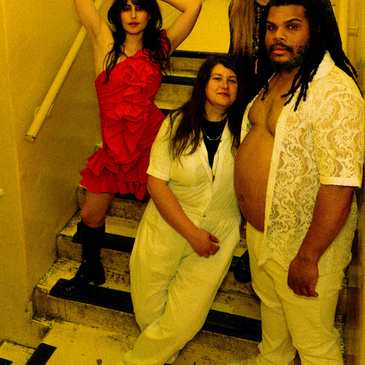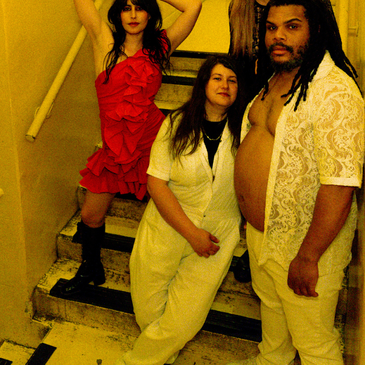
Mannequin Pussy
White Eagle Hall
∙
New York
Saturday, February 1 at 8 pm EST
Rock
Concert Venue
Saturday, February 1 at 8 pm EST
Rock
Concert Venue
Entry Options
Details
Artists
Description
Mannequin Pussy’s music feels like a resilient and galvanizing shout that demands to be heard. Across four albums, the Philadelphia rock band that consists of Colins “Bear” Regisford (bass, vocals), Kaleen Reading (drums, percussion), Maxine Steen (guitar, synths), and Marisa Dabice (guitar, vocals) has made cathartic tunes about despairing times. “There's just so much constantly going on that feels intentionally evil that trying to make something beautiful feels like a radical act ,” says Dabice. “The ethos of this band has always been to bring people together.” Their latest I Got Heaven, which is out March 1 via Epitaph Records, is the band’s most fully realized LP yet. Over 10 ambitious tracks which abruptly turn from searing punk to inviting pop, the album is deeply concerned with desire, the power in being alone, and how to live in an unfeeling and unkind world. It’s a document of a band doubling down on their unshakable bond to make something furious, thrilling, and wholly alive.
Following the 2019 release of their critically acclaimed third album Patience, Mannequin Pussy returned in 2021 for their EP Perfect. They toured that release relentlessly and added guitarist Maxine Steen to the band’s official lineup. Where the band members’ personal lives were in transition with breakups, changing living situations, and periods of self-reevaluation, their time together on the road was a grounding and clarifying force. “There was so much going on in our lives that it was the perfect opportunity to recalibrate who we were as people and musicians,” says Regisford. The band changed their entire formula, choosing to write together in Los Angeles with producer John Congleton over slowly crafting tracks at home. “When I've written songs, it's usually a very solitary process,” says Dabice. “So this was shedding a lot of those hermit-like qualities to do something intensively collaborative. Your best work comes when you allow other people into it.”
By December 2022, the band had 17 new songs written with Congleton in Los Angeles. “Everyone felt empowered to speak up about their own ideas to make this thing the best it could possibly be,” says Regisford. New member Maxine Steen, who has made music with Dabice for years including their side project Rosie Thorne, was especially essential to the writing sessions. The album opener “I Got Heaven” initially started as one of Steen’s demos. “When she showed it to me I knew it was going to be fun because the verses have this hard-hitting and aggressive approach but the chorus allows for a really soaring melody,” says Dabice. The result is electric. Over walloping guitar riffs, Dabice defiantly yells, “And what if I’m an angel? Oh what if I’m a bore? And what if I was confident would you just hate me more?
The song with its righteous lyrical blending of the sacred and profane is an unapologetic look at Christian hypocrisy. “I don't think there's ever been anything in need of a spiritual revolution more than modern-day Christianity,” says Dabice. “It sickens me the way that people use it as a way to do the worst things imaginable, say the worst things imaginable, and pass the worst imaginable legislation that directly harms people.” Instead of judgment, greed, and avarice, the songs on I Got Heaven ask what it really means to genuinely care about the people around you and help your communities in ways you can. “The world that we live in is heaven,” says Dabice. “We live on the most beautiful planet in the solar system, just by a chance and we are continuingly destroying it.”
This sentiment is mirrored by the album’s cover art: a figure and a pig in nature. There’s an intentional ambiguity there that makes you wonder if this person is leading the animal to slaughter or its protector. “We should really be the shepherds and the protectors of everything that we have and the world we live in,” says Dabice. I Got Heaven is an album that understands the stakes of its message: there are countless references to fire, hunger, and holiness. Here, teeth gnash and bodies are temples that ache with desire. On the yearning single “Nothing Like,” which is anchored by a dancey, shuffling drum beat from Reading, Dabice’s voice eventually morphs from a coo to a roar as she sings, “Oh what’s wrong with dreaming of burning this all down?”
Even when the songs on I Got Heaven don’t deal with fundamental human questions about how to live, Mannequin Pussy still finds ways to add urgency and resonance. Just take the buoyant and playful single “I Don’t Know You,” which slowly builds to a hair-raising peak with Reading’s brushed percussion, Steen’s enveloping synths, and a thoughtful groove from Regisford. “On that song, I changed the tuning last minute which transformed the song but everyone instinctively knew what to do,” says Dabice. “It was really cool to watch a song come alive in real-time. It's such a gift to meet other people who are creatively on the same wavelength as you, where there's no judgment in sharing ideas.”
The lightness of this track pairs perfectly with the rest of the tracklist, even when it’s snarling rock like “Loud Bark” or punishing hardcore punk with Regisford sharing lead vocal duties on “OK? OK! OK? OK!” “If you're a Mannequin Pussy fan, you know that we're going to have some rippers,” says Regisford. “We're gonna have something that's going to be in your face. But we're also going to give you something that's going to be light to the touch with its own version of aggression.” The loud and uncompromising single “Of Her,” finds Dabice screaming, “I was born / Of her fire / Of sacrifices That were made / So I could make it.” It’s a song about living life without regrets and understanding the sacrifices that you and your parents, especially your mother, made to allow you to live the life you want.
I Got Heaven is a visceral and stunning album for people who aren’t content with the status quo, made by people who challenged themselves and got out of their comfort zone. ”We're supposed to be living in the freest era ever so what it means to be a young person in this society is the freedom to challenge these systems that have been put on to us,” says Dabice. “It makes sense to ask, what ultimately am I living for? What is it that makes me want to live?”
Militarie Gun are a truly uncategorizable band. Led by vocalist Ian Shelton, the band’s debut full-length, Life Under The Gun, is almost impossible to describe without bouncing between contradictions. Is it abnormally aggressive pop music or is it unusually catchy hardcore? Is it deeply intellectual or is it satisfyingly primal? Is it a vulnerable attempt to unpack lifelong cycles of hurt, or is it a collection of world-beating, absurdist punk anthems? In the end, the answer is obvious: it’s all of it. It’s Militarie Gun.
Since forming in 2020, the group have been releasing music and touring at a startling rate, and while Life Under The Gun feels like a culmination of this recent hard-earned momentum, the record is inextricably linked to Shelton’s past. “I grew up in a household with family members struggling with addiction,” he explains. “It was an oppressive force. We were always wondering, ‘Is it going to be a good day or a bad day? Are the cops going to come today? What am I going to come home to after school?’ You could only escape it for so many hours at a time.” The challenges of his homelife were only exacerbated by living in Enumclaw, WA, a sparsely populated rural suburb where Shelton spent his formative years longing for a way out. In this difficult and stifling environment, the roots of Life Under The Gun began to grow. As he began to pick up instruments, play in bands, and write his own songs, music quickly became a vital outlet for self-expression, but Shelton couldn’t shake the idea that it was also a literal escape route.
And he was right. After high school, Shelton bounced around the Pacific Northwest before eventually landing in Seattle, where he founded the pummeling hardcore outfit, Regional Justice Center. The band released two critically acclaimed full-lengths, toured around the world, and began allowing Shelton to live some of the things he’d set his sights on as a child. Parallel to these musical successes, he was also pursuing his other love: film. While in Seattle, Shelton began directing music videos for his bands and soon had credits under his belt for other artists like Angel Du$t, Drug Church, Supercrush, and more. The directing was going so well that he moved to Los Angeles with plans to put music on the backburner to pursue filmmaking full-time. “Then in 2020 everything got derailed,” he says. “I felt like I was heading into the final year of RJC and then I was going to move on from music, but when everything shut down that just left me with my most immediate interest, which was songwriting.”
What followed was a flurry of activity that still hasn’t let up. Shelton’s restless creative drive took over and he spontaneously wrote the first songs that became Militarie Gun, which were followed by more songs…and then more and more. The sound was decidedly new for him: still firmly rooted in punk and hardcore but more hook-driven, pulling from influences like Guided By Voices, Fugazi, or The Jesus Lizard. Shelton quickly recorded Militarie Gun’s 2020 debut EP, My Life Is Over, by himself, then rounded out the lineup with guitarists Nick Cogan and William Acuña, and drummer Vince Nguyen (Max Epstein played bass on Life Under The Gun). 2021 saw the release of the dual All Roads Lead To The Gun EPs and the start of a seemingly endless run of tour dates. Then in 2022, Militarie Gun teamed with Dazy for the wildly received collaborative single “Pressure Cooker,” which was soon followed by the band signing to Loma Vista Recordings and releasing a deluxe edition of the All Roads Lead To The Gun EPs that included even more new material. All of this along with Shelton’s production work and guest appearances with groups like MSPAINT, Public Opinion, and Cold Mega.
Militarie Gun soon had the makings of Life Under The Gun: the kind of debut album that feels like a true arrival, one forged by a lifetime of experience and effort that’s now allowed an artist to fully come into their own. Engineered by Taylor Young at The Pit Recording Studio, the album’s 12 tracks take all of the best parts of Militarie Gun’s earlier work and amps them up to the highest possible degree. It sounds massive without sacrificing the punk spark–full of driving drums, distorted bass lines, and of course Shelton’s instantly recognizable roar–only this time everything is bigger and even catchier. “This is what I thought we sounded like all along,” Shelton laughs. “It’s always felt like a melody-forward band to me, but I think now we’re finally achieving what I was always setting out to do.”
The clarity of his singular vision is palpable in each song’s deft blend of aggression and accessibility, but Shelton also cites collaboration as essential to his process–whether with his band members or outside sources like Young and James Goodson of Dazy, who sings harmonies on much of the album. In the end, it’s no surprise that his lifelong desire to find connection through art has manifested in the direction of his own music. “A huge part of it is just about sharing your energy with other people,” Shelton says. “Sometimes with punk that’s coming from anger, but it’s exciting to do that with the melodic side as well, to take something that’s stuck in your head and try to make it stuck in someone else’s, too.”
Life Under The Gun opens with the razor sharp guitars and tremendous chorus of the ADHD anthem “Do It Faster,” making it clear that Militarie Gun haven’t just embraced melody, they excel at it. The song’s impatient lyrics capture Shelton’s hyperactive creativity and echo all the way back to his youth spent imagining the life he now leads. “Very High” follows and somehow offers an even bigger chorus, while continuing to draw his past and present together in a way that feels both critical and empathetic. “It’s just about addiction,” Shelton says. “It’s about feeling bad and reaching for something to change that. I started exploring drugs as an adult and it made me look back on my childhood in a different way.” On tracks like “Will Logic,” “Return Policy,” and “Think Less,” he interrogates interpersonal relationships through this distinctly blunt and self-aware lens, dipping into spite or anger only to turn the blame back on himself again.
On “Never Fucked Up Once,” Shelton demonstrates this willingness to approach the third rail, juxtaposing some of the album’s most darkly comedic lyrics with its most overt pop-rock sensibilities. Much of Life Under The Gun feels informed by this need for human connection, but also the messiness that often comes with it. “Sway Too” and “See You Around” showcase Militarie Gun pushing themselves to be as tuneful as possible, especially on the latter’s mellotron-led balladry, but they also pose some of the album’s most difficult questions about what happens when we hurt one another. “It would be easy to avoid talking about how I’ve been hurt or how I’ve hurt other people,” Shelton explains, “but I think it’s important to make something that’s true and has teeth. Sometimes when you feel so aggressively against something, you need to stop and wonder if it might apply to you.”
Life Under The Gun closes with its title track, two minutes and 46 seconds of widescreen punk that pivots from pounding aggression to a triumphant climax of windmill-able guitars and layered harmonies. Shelton sings the final refrain “a life of pursuit ends up pursuing you” like an urgent reminder to himself: move forward or get swallowed up–your past might shape you, but it doesn’t have to define you. “I think the best case scenario is you learn from the things you’ve been through instead of continuing that cycle,” he says. The song’s final lone chord rings out like a question, asking if the listener is ready for the changes ahead. It’s a fittingly hopeful-yet-ambiguous ending for the debut album from a band that’s already come so far and evolved so much–but whose story has only just begun.


